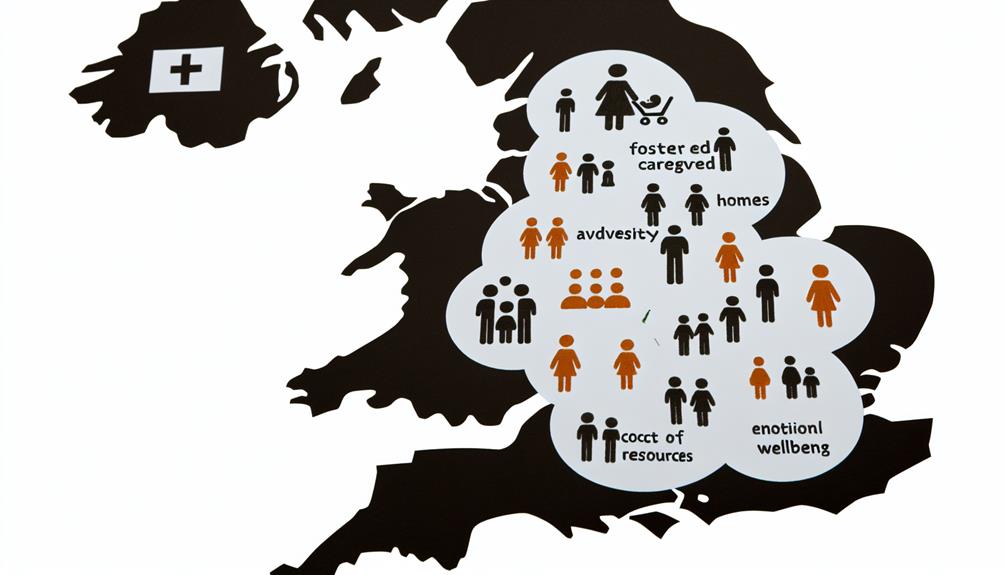Foster care faces challenges including cultural sensitivity and child safety. Reforms like the USA's Family First Prevention Services Act and the UK's Children and Social Work Act address these issues, emphasising prevention and quality care. Permanency support programs like in Australia seek stability for kids. Key elements of reforms also include enhanced training for caregivers and support in meeting diverse needs. Your deeper understanding of reforms' practical impacts, from emotional well-being improvements to successful family reunifications, awaits in the subsequent material.
Key Takeaways
- The USA's Family First Prevention Services Act addresses foster care challenges by emphasizing preventative measures.
- The UK's Children and Social Work Act focuses on providing high-quality care to tackle issues in foster care.
- Australia's Permanency Support Program reform aims to provide stability for children in foster care.
- Caregiver training reforms are crucial in equipping foster parents to meet the diverse needs of children in care.
- Financial support reforms broaden the pool of potential foster parents and provide stable homes for foster children.
Understanding UK Foster Care Challenges

While it's easy to overlook, understanding the challenges faced by the UK foster care system is important to developing effective reforms that can truly make a difference. One of the key issues lies in the area of cultural sensitivity. It's essential that foster parents are provided with adequate training to understand and respect the diverse cultures of the children they foster.
As you navigate this complex landscape, you'll realise that cultural sensitivity isn't about mere tolerance. It's about embracing and celebrating differences, fostering an environment of inclusion, and demonstrating genuine respect for the child's cultural heritage. Remember, every child in care has a unique story infused with their cultural identity, which needs understanding and appreciation.
Foster parents' training plays an instrumental role here. It must go beyond the basics of child care, delving into cultural awareness and understanding. This training should equip foster parents with the tools to handle delicate cultural nuances, fostering a sense of belonging and understanding in the child. Without it, we run the risk of children feeling alienated or misunderstood.
Historical Context of Foster Care
To fully comprehend the current challenges and the importance of reform in this area, it's helpful to step back and understand the historical context of foster care. The origins of foster care can be traced back to the English Poor Law of 1562, which allowed for the placement of poor children into indentured service until they became adults. This was an early form of what we now know as foster care.
Throughout history, the child welfare system has evolved greatly. In the 1800s, the emphasis was on removing children from ‘unfit homes' and placing them into orphanages. However, by the 1900s, there was a shift towards family preservation and the best interests of the child. This led to the creation of the modern foster care system that focuses on temporary placement with foster families, with the ultimate goal of reuniting children with their biological families, if feasible.
Understanding this evolution gives you a unique perspective on the challenges facing foster care today. It highlights the progress that's been made, but also underscores the importance of constant reform in order to meet the ever-changing needs of children in care. Your mastery of this historical context is crucial in shaping future improvements in the foster care system.
Reforms in the Foster Care System
In addressing the intricacies of the foster care system, it is vital to examine the recent reforms designed to better protect and serve children in care. These reforms reflect international best practices, offering valuable global comparisons, and focus on enhanced caregiver training.
Below is a snapshot of some key reforms in the foster care system:
| Country | Reform | Focus |
|---|---|---|
| USA | Family First Prevention Services Act | Prevention and family reunification |
| UK | Children and Social Work Act | High-quality care and support |
| Australia | Permanency Support Program | Stability and permanency |
In the USA, the Family First Prevention Services Act prioritizes prevention and family reunification, enhancing the support for caregivers. The UK's Children and Social Work Act aims to ensure high-quality care and robust support systems for caregivers. Australia's Permanency Support Program focuses on providing stability and permanency for children in care.
Through these reforms, you can see a global emphasis on ensuring children's safety, stability, and well-being. Caregiver training plays a crucial role in these efforts, making sure that those who care for children in the system are well-equipped to meet their diverse needs.
Impact of Reforms on Foster Care
As a result of these reforms, you'll notice significant changes in the foster care system that aim to better protect and serve children. The impact of these transformative measures is substantial, and the process of Reform Evaluation is vital to understand their effectiveness.
Reforms have breathed new life into the system, with initiatives centred on enhancing the emotional and psychological well-being of foster children. By bolstering support services, they've facilitated an environment to foster resilience in these children, helping them overcome trauma and adversity.
These reforms have also strengthened the recruitment and retention of foster parents, a critical aspect of ensuring that each child in the system has a stable, nurturing home. By providing better training and support to foster parents, these reforms guarantee that children's needs are adequately met.
Moreover, the push towards family reunification and prevention services aims to reduce the number of children entering the system. This shift towards prevention and family preservation is a confirmation of the system's evolution in response to the identified challenges.
Future Projections for Foster Care

Looking ahead, you're likely interested in the predicted trends for foster care and how they might influence this vital system.
It's important to ponder the role of technological advancements in adoption and how they're shaping the landscape for prospective parents and children alike.
Let's also discuss forthcoming policy changes and their potential impacts on care standards and delivery.
Predicted Foster Care Trends
Projecting into the future, you'll see significant shifts in foster care trends, driven by ongoing reforms and societal changes. Caregiver Support Initiatives are anticipated to grow, providing more resources for foster parents to navigate the unique challenges they face. This support won't only improve the quality of care provided but also encourage more individuals to contemplate fostering.
Foster Youth Empowerment will also gain traction. You'll see programs focusing on equipping these young people with life skills, education, and emotional support. This empowerment aims to break the cycle of disadvantage, paving the way for them to lead fulfilling, independent lives. These predicted trends reflect a more inclusive, supportive, and effective foster care system, one that truly serves the best interest of the child.
Technological Advancements in Adoption
Harnessing the power of technology, future reforms in foster care are poised to revolutionize the adoption process. There's an emerging focus on digital adoption and AI integration, creating a sophisticated, efficient, and user-friendly experience for you.
Imagine an AI-driven platform that matches prospective parents with children based on compatibility metrics. It's not just about speeding up processes but also about augmenting quality and longevity of placements.
Here's a glimpse of what the future holds:
| Technological Advancement | Potential Benefit | Impact on Adoption |
|---|---|---|
| Digital Adoption | Streamlined Information Management | Faster, more efficient processes |
| AI Integration | Enhanced Matching Algorithms | Higher success rates for placements |
| Advanced Data Analytics | Improved Decision Making | Better outcomes for children |
The integration of technology is certainly a game-changer, reshaping the future of foster care and adoption.
Policy Changes Impacting Care
In the domain of policy changes, there's a growing emphasis on reforms that could greatly enhance the quality and efficiency of foster care. The legislative impact of these reforms is considerable, altering the landscape of foster care.
Socio-economic factors play a critical role in shaping these changes. With an understanding of the economic challenges foster families face, policy changes aim to provide adequate financial support. This not only enables stable homes for foster children but also broadens the pool of potential foster parents, leading to less overcrowding in the system.
As you navigate these changes, staying informed on the latest developments is crucial. After all, understanding the impact of these reforms will empower you to provide the best possible care for foster children.
Case Studies on Foster Care Reforms

Let's now turn our attention to some concrete examples of foster care reforms.
By examining case studies of successful changes, you can gain valuable insights from reformed systems.
This exploration will provide you with a clearer understanding of the practical impact of these reforms.
Successful Foster Care Changes
Delving into case studies on foster care reforms, you'll find a myriad of successful changes that have greatly improved the system. Resilience Training, for instance, has equipped foster children with essential coping skills, enabling them to thrive despite adversities. This program has shown remarkable outcomes regarding emotional stability and academic performance.
On the other hand, Caregiver Support programs have notably reduced caregiver burnout. By offering emotional assistance, training, and respite services, these initiatives have fostered a more nurturing and stable environment for foster children.
Through these successful reforms, we witness the amazing transformation of a system once marked by challenges. It's inspiring to see how these changes have positively impacted the lives of countless foster children and their caregivers.
Insights From Reformed Systems
To understand the profound impact of these reforms, we need to explore some case studies that shed light on the transformation of foster care systems. Take for instance, 'Reformed Training Models' which prioritize skill-building and knowledge acquisition for foster parents. Then there's 'Enhanced Support Networks', highlighting the importance of a strong community for foster children and their caregivers.
Let's examine these in detail:
| Case Study | Impact |
|---|---|
| Reformed Training Models | Improved competence and confidence among foster parents |
| Enhanced Support Networks | Increased emotional and practical support for foster families |
These evidence-based reforms are reshaping foster care. You're seeing improved outcomes for children and their caregivers. It's clear that targeted, thoughtful reform isn't just possible – it's making a real difference.
Frequently Asked Questions
What Is the Process of Becoming a Foster Parent in the Uk?"
To become a foster parent in the UK, you'll meet strict eligibility criteria, undergo extensive background checks, and complete thorough foster training. It's a rigorous process, but incredibly rewarding for those who qualify.
What Kind of Support Is Available to Foster Parents in the Uk?"
You've got access to robust support in the UK as a foster parent. Parenting training enhances your nurturing skills, while support networks provide a comforting community. It's not an easy journey, but you're not alone.
Are There Any Financial Benefits or Incentives for People Who Become Foster Parents?"
Yes, you'll find financial incentives in fostering. Foster Care Taxation benefits can offset costs, and Adoption Subsidies provide ongoing support. It's not a fortune, but it helps make becoming a foster parent more feasible.
How Can One Deal With the Emotional Challenges of Fostering a Child?"
Managing the emotional challenges of fostering a child isn't a walk in the park. It's crucial you develop emotional resilience, lean on support networks, and seek professional help for trauma healing when needed.
What Is the Role of Biological Parents in the Foster Care System?"
As a biological parent, you retain certain parental rights in the foster care system. These rights often include visitation agreements, which allow you to continue interacting with your child under supervised settings.
Conclusion
Reforms are the guiding light in steering through the turbulent waters of foster care challenges. They're not the cure-all, but they've indeed made the journey less tumultuous, driving positive shifts in the system.
As we look to the horizon, it's clear there's still work to be done. Your understanding and support in championing these reforms can help us guarantee no child in need sails through life's storms without a safe harbour.




